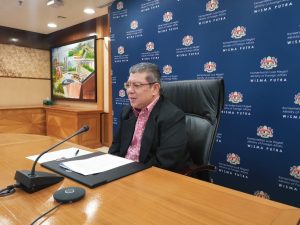Malaysia’s government will propose that the Association of Southeast Asian Nations (ASEAN) establish an informal relationship with Myanmar’s National Unity Government (NUG), the country’s Foreign Minister Saifuddin Abdullah said on Saturday.
Speaking to reporters, Saifuddin said that he was making the proposal after a year that has seen scant progress on the implementation of ASEAN’s Five-Point Consensus peace plan, which aims to bring about a cessation of violence and the opening of political dialogue involving “all parties” to Myanmar’s conflicts. Malaysia lamented that there had been “no progress” on the implementation of the plan, largely due to the junta’s lack of cooperation.
“We are not proposing for ASEAN to recognize other governments, but such informal engagement may be conceivable, especially on how humanitarian aid to the people of Myanmar who are still in their country can be delivered,” he told reporters, according to a report in the Malaysian state media outlet Bernama.
The NUG was set up a year ago in order to coordinate resistance to the military junta that seized power in February 2021. It includes most of the senior leadership of the ousted National League for Democracy (NLD) government, in addition to ethnic minority representatives and figures from civil society.
Since taking up his post last August, Saifuddin has taken a relatively robust line on Myanmar’s military government, at least by the standards of ASEAN, many of whose members have taken a very conservative interpretation of the bloc’s stricture of mutual “non-interference” in member states’ internal affairs.
In particular, he has expressed open frustration with the junta’s inaction and clear lack of interest on the implementation the Five-Point Consensus since its formulation in April 2021. In the year since, the junta has only increased its violent attacks on the anti-junta resistance, spurring the emergence of greater resistance, and refused to grant ASEAN’s special envoy access to senior members of the NUG or ousted NLD government, as per the Five-Point Consensus.
In October, Saifuddin warned that if the military junta continued to drag its feet on the implementation of the Consensus, Malaysia would open relations with the NUG. Last week, he announced off-handedly that Kuala Lumpur had engaged with the shadow government, the first time that an ASEAN leader had admitted to such contacts.
Saifuddin said that this was one of three proposals that Malaysia will bring to the ASEAN Foreign Ministers’ Meeting on May 5, which will be held via videoconference as an entrée to the U.S.-ASEAN Special Summit in Washington on May 12-13. According to the Bernama report, the other two are to double ASEAN’s humanitarian aid to Myanmar, the delivery of which is one of the five points of consensus, and to strengthen the position and function of the bloc’s special envoy to Myanmar.
The Malaysian foreign minister’s suggestion is not likely to be adopted by ASEAN, given the reluctance of some nations – particularly Thailand, Laos, Vietnam, and Cambodia – to countenance greater ASEAN intervention in the affairs of its errant member state. But it is indicative of the slowly growing frustration within the Southeast Asian bloc about the military junta’s apparent lack of concern for regional opinion, and could presage a further hardening of attitudes in the months to come.
































